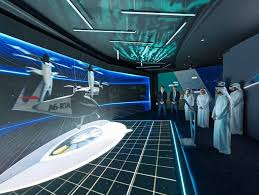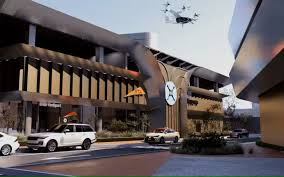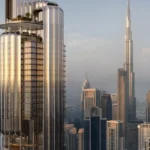Now Reading: “Flying Taxis Soon? Dubai’s Vertiports Pave Way for Futuristic Commutes 2025”
-
01
“Flying Taxis Soon? Dubai’s Vertiports Pave Way for Futuristic Commutes 2025”
“Flying Taxis Soon? Dubai’s Vertiports Pave Way for Futuristic Commutes 2025”

Table of Contents
Dubai has always been at the forefront of futuristic innovation—from the tallest buildings to driverless metros. Now, the city is preparing to take travel to the skies with a new concept: Vertiports. These are special take-off and landing hubs designed for electric flying taxis, drones, and other vertical take-off and landing (VTOL) aircraft.
As cities worldwide struggle with ground traffic congestion, Dubai is investing in building “sky highways” that will connect various parts of the city—reducing travel time, cutting carbon emissions, and offering a completely new commuting experience.
What Exactly Are Vertiports?

Vertiports are small airports designed especially for electric air vehicles like air taxis and cargo drones. Unlike traditional airports, Vertiports can be built on rooftops, near office complexes, shopping malls, and busy intersections. Their key feature is enabling vertical takeoff and landing (hence the name “Verti-port”).
In simple words, imagine booking an air taxi through your phone, heading to the nearest Vertiport just five minutes away, and flying over traffic to your destination—all within 15 minutes. This is not a science-fiction dream; this is the near future that Dubai is building today.
Why Is Dubai Investing in Vertiports?

Dubai’s leadership has always aimed to make the city a global symbol of smart urban living. The Dubai Roads and Transport Authority (RTA), along with global air mobility companies like Joby Aviation, Skyports Infrastructure, and EHang, are working together to develop these futuristic stations.
Sheikh Mohammed bin Rashid Al Maktoum, Vice President and Prime Minister of the UAE and Ruler of Dubai, recently approved plans to build the city’s first Vertiport network, which will connect key points such as Downtown Dubai, Dubai Marina, Dubai International Airport, and Palm Jumeirah.
According to the RTA, this network could reduce the average 45-minute ground journey between Dubai Marina and the airport to just 10 minutes via flying taxis.
How Will Vertiports Change the Way People Travel?
- Faster Commutes:
No more waiting in traffic for hours. A journey from one end of Dubai to another could be done in minutes. - Eco-Friendly Transport:
Vertiports support electric aircraft, which means no harmful emissions compared to cars or buses running on petrol or diesel. - Less Noise, More Efficiency:
Advanced VTOL aircraft are designed to produce far less noise compared to helicopters. These will operate quietly even in busy city areas. - Luxury Experience:
With futuristic lounges, smooth boarding, and exclusive services, Vertiports could offer a more luxurious experience than even business class air travel. - Reduced Ground Congestion:
With part of the daily traffic taking to the air, ground congestion could decrease, improving life for even non-air taxi users.
Who Is Building These Vertiports?
Dubai has partnered with Skyports Infrastructure, a leading UK-based company specializing in vertiport design and development. Skyports has already shared designs featuring sleek, modern terminals complete with passenger lounges, security checks, and charging points for electric aircraft.
The company is working closely with Joby Aviation, an American electric air taxi firm, whose aircraft can fly at speeds of up to 320 km/h with a range of 240 kilometers on a single charge.
Together, these companies plan to have Dubai’s first operational Vertiports ready before the end of the 2026–2027 period.
Safety and Regulations First
Of course, flying taxis will only be allowed to operate once the highest safety standards are met. The General Civil Aviation Authority (GCAA) of the UAE is working on detailed regulations covering air traffic control, passenger safety, noise limits, and pilot licensing.
Experts believe that Dubai’s existing reputation for strict but business-friendly regulations will help the city become one of the first in the world to launch commercial air taxi services.
What About the Costs?
While the flying taxi service will likely cost more than a regular car ride at first, experts suggest that over time, as more Vertiports are built and more VTOL aircraft enter service, prices could become affordable to middle-class passengers—just like how Uber rides became cheaper after mass adoption.
The government also plans to keep prices competitive to encourage public adoption, especially for business travelers and tourists.
Impact on Tourism and Economy
Dubai’s Vertiport plan is not only about smoother commutes; it’s also about boosting the city’s economy. Flying taxis are expected to:
- Attract technology investments from global aerospace companies.
- Enhance tourism by offering unique sky tours over the Burj Khalifa, Palm Jumeirah, and Desert Safari zones.
- Create new jobs, ranging from flight operators to Vertiport managers and aircraft maintenance staff.
- Strengthen Dubai’s image as the world’s most futuristic city.
Challenges on the Horizon
As exciting as this future sounds, building a functional Vertiport network comes with challenges:
- High Infrastructure Costs: Building air traffic control systems and Vertiports will require billions of dollars in investment.
- Public Trust: Many passengers will need time to feel safe boarding an aircraft without a human pilot.
- Weather Dependency: Dubai’s summer heat, strong winds, and occasional sandstorms could affect air taxi reliability.
However, Dubai officials and companies are confident these obstacles can be solved with technology, proper planning, and public education.
When Will We See Vertiports in Action?
If everything goes as planned, the first public flights from Dubai’s Vertiports could take off by 2026 or 2027. Test flights are expected to start sooner, possibly as early as 2025, after full safety trials and government approvals.
By 2030, Dubai could have a full Vertiport network connecting the city’s major hubs, changing the way people work, travel, and enjoy leisure time forever.
Conclusion
Dubai’s sky highways are no longer a dream—they are becoming reality. Vertiports will soon redefine urban travel, making flying taxis as normal as car rides. With global partnerships, government support, and a vision to lead the world into the future, Dubai is preparing to fly higher than ever.
As the world watches, Dubai is building the blueprint for every modern city dreaming of a sky full of flying cars.
Read More:- Shobha Realty Launches Its Most Luxurious Project Yet—Full Details Inside 2025



















